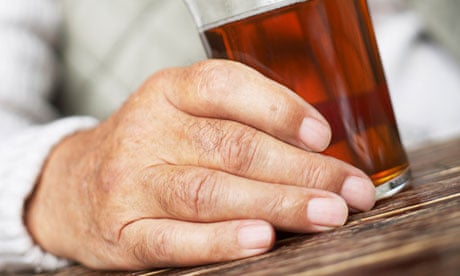In her two-bedroom flat close to the centre of Brighton, Ann, 72, has not yet cleared out her late husband's clothes, but she's given away his wine. "My daughters have said they'll help, but they are busy people. One is a GP and the other lives in the West Country. They have asked me to move closer to them, but I'm a stubborn old lady."
Her husband had been in a nursing home since developing dementia some three years ago. "We always enjoyed nice wine, and when the girls moved on we'd open a bottle most evenings. When he moved out, I started drinking a little earlier in the day, I suppose. It does get lonely and you think, why not?"
When the nursing home rang to say her husband had died, Ann was too drunk to understand what they were saying. It was a turning point. "I was wallowing a bit, but it's silly at my age, so I've decided to get out more and drink less. My daughter tells me I've caught it just in time."
Today the Big Lottery Fund, which distributes most of the lottery good causes pot, is announcing an investment of £25m into a UK-wide programme, Rethink Good Health, to tackle late- onset alcohol misuse. It is looking for a partner to manage the project, which would establish 15 to 20 individual centres across the country. Peter Ainsworth, the Big Lottery Fund chairman, insisted that older people were not being picked on for enjoying the occasional tipple. He said: "Most older people drink moderately, and nobody is suggesting for a moment that older people should be discouraged from enjoying a well-earned pint or a glass of wine relaxing with family or friends.
"But while it is young people who are often stigmatised for their drinking habits, a silent story is evolving among older people as they experience life-changing events such as retirement, redundancy or bereavement. Today's Big Lottery Fund £25m investment will help call time on this trend by supporting evidence-based preventive approaches to alcohol misuse among older people."
For Barnsley pensioner Dawn, her social drinking became a problem after her daughter left for university and her husband had to work long hours. "At the time you don't realise what you are doing. But then, whether you are 14 or 84, you have to seek help."
She now works for Phoenix, a national programme that helps people with drug or alcohol problems and which, like many charities around the country, is seeing what one doctor is calling an "epidemic" of alcohol misuse among older people. Recent statistics show more admissions to hospitals in England of pensioners for alcohol-related injuries and illness than of 16- to 24-year-olds in 2012-2013. In the past five years there has been a 62% increase in alcohol-related admissions for the over-65s. The number of alcohol-related deaths in the UK remains highest in the 55-74 age group, and surveys suggest that since 1984 both men and women aged 45 to 65 have been exceeding the sensible limits in rising numbers.
It is a hidden health timebomb, said Dr Sarah Wadd, programme director for substance misuse and ageing research at the Institute of Applied Social Research at the University of Bedfordshire. She said: "Evidence suggests that the UK may be facing an epidemic of alcohol-related harm among older people. An estimated 1.4 million people aged 65 and over currently exceed recommended drinking limits, and the large numbers born in the post-second world war economic boom period – the so-called baby-boomers – are moving into old age drinking relatively high levels of alcohol compared with previous generations."
Alcohol prevention and treatments remain geared towards younger people.
In March this year Dr Tony Rao, a consultant old-age psychiatrist at South London and Maudsley NHS Foundation Trust, found that between 2002 and 2012 hospital admissions among people aged 60-74 for mental and behavioural disorders due to the use of alcohol had risen by 150%. from 3,247 to 8,120.
Experts advise refraining from drink on at least two days a week, yet more over-65s are drinking for six or seven days a week than any other age group.A recent report by the Royal College of Psychiatrists said people over 65 should drink less than other age groups – a maximum of 1.5 units of alcohol a day. The 2011 report said older drinkers are less able to process alcohol and the drink might also interact with medication they may be taking for other ailments.
It suggested that the advice of 14 units of alcohol for women and 21 for men each week is based on work with young adults, and called for separate advice on safe drinking limits for older people, with an upper "safe limit" of 11 units per week.

Comments (…)
Sign in or create your Guardian account to join the discussion